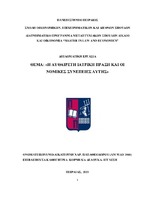Η αυθαίρετη ιατρική πράξη και οι νομικές συνέπειες αυτής

View/
Keywords
Ιατρική πράξη ; Αυθαίρετη ιατρική πράξη ; Συναίνεση του ασθενούς ; Ενημέρωση ασθενούς ; Ιατρική ευθύνηAbstract
The purpose of this paper is to study the arbitrary medical practice and its legal consequences. With the development of science and technology the “paternalistic model” of the doctor as the sole person responsible for deciding on the patient’s health has been abandoned and now the patient becomes an associate of the doctor and has every right to be informed about his state of health in order to “give the green light” to the doctor to proceed to the appropriate treatment. Therefore, any medical procedure that takes place without the required valid and informed consent of the patient is completely illegal and arbitrary. The right of the patient to be informed about his state of health, arose from the principle of the individual's self-disposition as a right of self-determination and free disposal of his personality elements, such as his body, especially when he is going to undergo some kind of operation, even and whether it is intended to improve his health or his physical rehabilitation.
In the present paper, a historical review is made regarding the transition from the complete irresponsibility of the doctors during their duties, until the full substantiation of their responsibility. The types of medical practice are being elaborated in detail as well as the theories that have been supported regarding its legitimacy. The informed patient's consent is also being examined as a necessary condition for performing any medical procedure and the exceptions in which the doctor does not need to obtain the patient's consent are being analyzed as well. The legal bases, in which the doctor's responsibility for an arbitrary medical act arises, a responsibility that can be civil, criminal, or disciplinary (confluence of legal claim bases), are also listed. Finally, it is worth mentioning the problematic issues that have divided the scientific community, as their implementation without a framework of individual consent, leads to a brutal violation of human rights and dignity of the individual, such as medically assisted reproduction, abortion , tissue and organ transplantation, medical research, etc., as well as the analysis of tragic ethical dilemmas for health scientists, such as the very current, unfortunately, dilemma of "patient screening" (Triage).
At a time when changes in science and technology are galloping, the Hippocratic model of the humanist physician who performs his function with absolute respect for his fellow man, based on the Hippocratic check "Benefit or not harm", is more relevant than ever.


